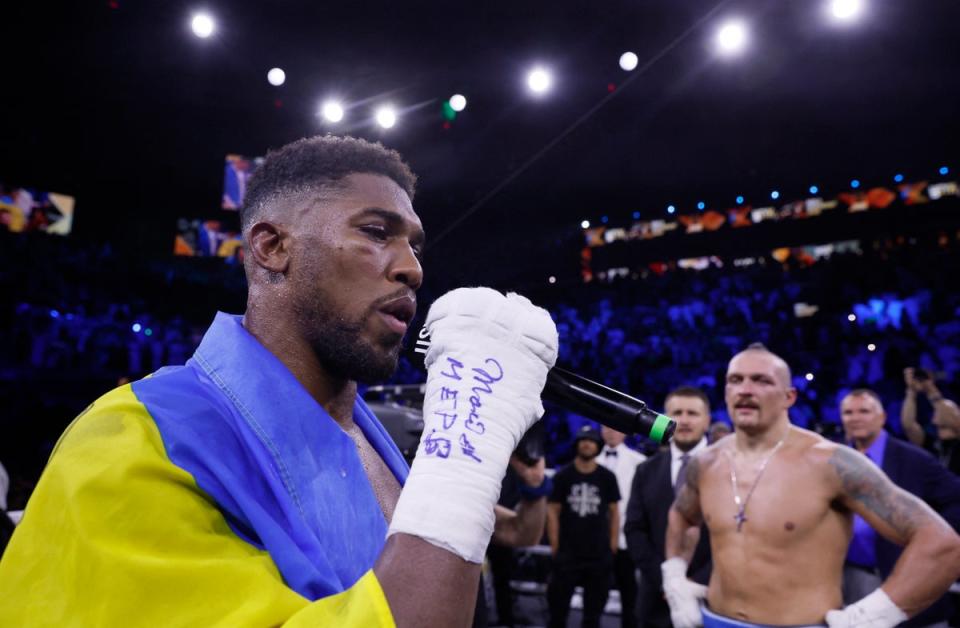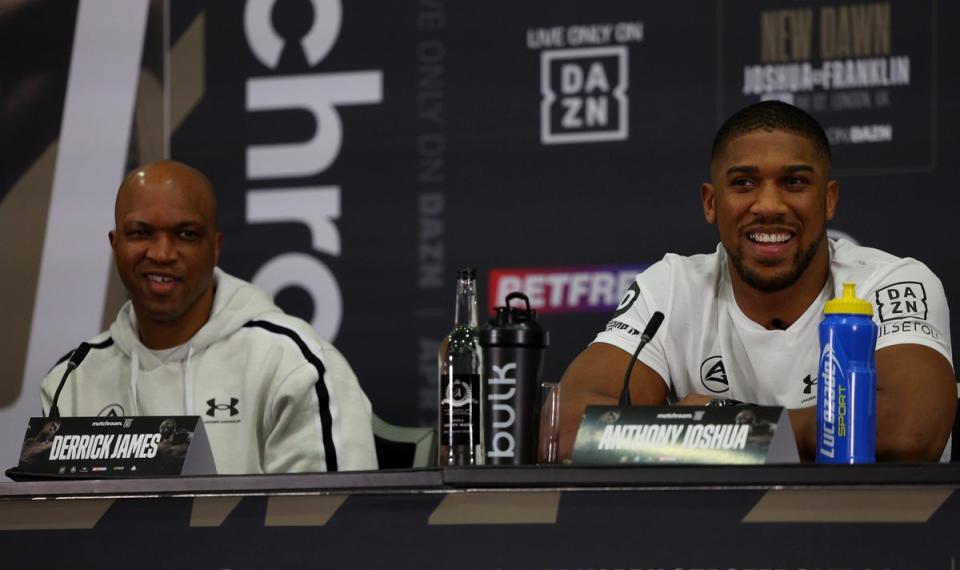Anthony Joshua: ‘I can’t be your shoulder to cry on, but I can wire you some cash’

“I don’t know where that... This is quite interesting actually,” Anthony Joshua chuckles.
It’s just been put to the heavyweight that he is a “hero”, that a generation of British fighters are “in awe” of him.
“Who’s in awe of me??” he asks, now leaning back and laughing at the ceiling.
“People.”
“People??” Joshua can’t quite comprehend the idea.
See, for years the former world champion has spoken of his desire to prove himself as the best heavyweight of his generation, but following a second straight defeat by Oleksandr Usyk, he seems to have altered the agenda.
“Legacy” is still important, he suggests, but for the first time he is speaking plainly about his priority. “Just at this time, money is the first thing that comes to mind,” he admits. “Money is part of a big jigsaw puzzle. The reason I say ‘money’ is just because I know how much it helps people. That’s my love language; I can’t be there for you emotionally, I can’t be there physically, because I’m working – but I can wire you some cash! I’m not gonna be there as a shoulder to cry on, because I don’t really have the energy or time for that; I’m trying to train and become a champion.”
If it seems somewhat callous, there will be critics of Joshua who will want to latch onto those comments. They will argue it is the ‘real’ side of a boxer who has at times been accused of being ‘fake’. When ringside judges condemned Joshua to a second defeat by Usyk in 11 months, back in August, the Briton seized a microphone where he had been unable to seize back his heavyweight belts. His ensuing, frustrated monologue led to claims that Joshua’s “mask” had slipped.

In truth, there has always been something enigmatic about Joshua – a pulverising presence in the ring, a politer one outside of it. Does that dictate that his gentler side is a facade? The suggestion seems too simplistic. It is something Joshua acknowledges himself; “I think people might not have understood why, when I’m fighting, I’m one way inside the ring and another outside the ring,” the 33-year-old says, something on which he will elaborate later.
And as he delves deeper into the topic of money vs emotion, it becomes clear that Joshua’s approach to maintaining relationships is not necessarily as insensitive as it might have initially appeared.
“I just know how much finances help,” he explains. “I just know what it’s like to not have [anything], and for no one to give you a look-in, no one to care. Being in a position where I can help means a lot, and that’s where money comes into it. I do a lot of charity work, which needs funding.
“I’m not saying ‘money’ because I’m balling, like I’m getting 50 Range Rovers and saying, ‘F*** you, you can’t come and sit in my car;’ I’ll get 50 Range Rovers to say, ‘Everyone come and feel what it’s like to sit in this Range Rover, and let’s put a plan in place so that you can get one, too.’”
And what of that second loss to Usyk, in Jeddah, where a beaten, tempestuous Joshua paid tribute to his opponent’s talents but did so seemingly begrudgingly? Where Joshua dumped the unified world heavyweight titles from the ring, as if he wished he could hurl them into the Red Sea itself?
“It’s really tough,” Joshua reflects. “It happened quick, very quick. I’ve taken every challenge that’s come my way, I’ve done my best, but I’ve got to do better – that’s for sure. In the ring, it was just me expressing like, ‘Man’s from the road, brother, I’ve come from the mud. I didn’t have a dad pushing me into boxing, saying, ‘Come on, son, you’ve got some talent.’ I did this s*** myself. I saw a path at the age of 18 when I was going down the wrong road. At 18 years old, to have seen that and made that decision, it takes a lot.”

So, he has no regrets about his outburst? “No way, it is what it is. If you don’t like it, don’t tune in, but that’s what you’re gonna get with me – raw and uncut.”
That episode aside, this conversation really does seem to be Joshua at his most uncut.
“That’s just life, it’s not always gonna be perfect, people go through things,” he continues. “If you’re tuning in, you’re gonna see it all – for years as well, you’ve been watching me. I don’t have any regrets.”
If Joshua does not harbour regrets from that night, he has at least learnt lessons from it.
“I’ve got to work harder,” he says, not for the last time. “I worked hard for that fight, I did, but it weren’t enough. To be good is one thing; to be very, very good... I give him his props. I worked hard, so he must have worked extremely hard. I had him praying in his corner! If you watch the fight, in his corner he was praying to God, that’s how much he wanted it! I’ve got to work harder, that’s what I told myself, and I’ve learnt what sacrifice is.”
It is something the former two-time world champion, who also won Olympic gold prior to turning professional, is trying to show Derrick James, his newest coach.
“Sometimes I think, ‘Is Derrick not seeing that I’m dying here?’” Joshua laughs, discussing his training sessions with the American in Texas. “But I realised that I can’t feel sorry for myself, because I’m actually gonna get something out of this. That’s how much he pushed me. I had to think to myself: ‘What does this mean? Oh, s***, he’s actually trying to get me to a certain level, which requires going through certain torturous methods.’
“A typical day is: Up early, cardio, calisthenics, stretch, physio, breakfast, sleep, gym, calisthenics, core, eat, physio, stretch, balance work, film study, bed by 9.30pm. Up in the morning again. We get two days off, where I’ll do physio, I might speak to Derrick, speak to someone about boxing, get a massage. You have to sacrifice things, but giving up means gaining in the long run anyway.”

These may seem belated epiphanies for a boxer who has spent his last 12 fights winning, defending and trying to reclaim world titles. Perhaps that is why the time is right for a change of pace, namely a clash with Jermaine Franklin on 1 April.
“AJ” will take on the 29-year-old American – unbeaten until a controversial points loss to Dillian Whyte in November – in a main event at the O2 Arena, where Joshua spent several important nights increasing his profile between 2014 and 2016. He has not boxed there since.
But that period of time was not only defining in Joshua’s career; it was in 2015 that he became a father to his son, JJ. As he speaks now, Joshua is in London for media duties ahead of his fight with Franklin, but the ‘sacrifices’ he mentioned include many minutes spent many miles from his son.
“It is what it is, it’s my decision, innit?” he says pragmatically. “I just find it interesting how he’ll reflect on it in his later life.” Joshua does his best impression of a tearful seven-year-old – “‘Dad, you wasn’t there for me when I was ...’ – before interrupting as himself: ‘Hey, shut up, man! Look at that Ferrari!’”
And therein lies another layer to the deceivingly complex Joshua: He might have failed to show self-awareness in his post-fight speech in Jeddah, but he exhibits it here, playfully acknowledging money’s limits as a ‘love language’.
“I’m joking,” he assures us. “I’m from a Nigerian household. A lot of Nigerian kids are very well raised, disciplined. JJ’s being raised in that environment, to have a lot of respect for his elders; I’ll stand up if someone comes in, shake their hand. I think people might not have understood why, when I’m fighting, I’m one way inside the ring and another outside the ring, but it’s my culture.”
Joshua might always be misunderstood. For a long time, he seemed to struggle in pursuit of being every imagined and imaginable version of himself. Now? He does not seem to care.
Maybe that is another belated epiphany. Then again, maybe it has come just in time for one last devastating run through the heavyweight division.
Click here to subscribe to The Independent’s Sport YouTube channel for all the latest sports videos.

